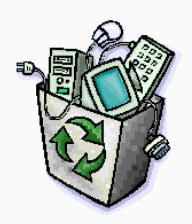|
I’m always looking for useful tech tips, not always successfully. Some are better than others, some pertain to what I’ve worked on the past week, and this one I just found randomly. I particularly like the Shift + F3 which changes a highlightedword from caps to lower case, and then to lower case with a starting cap. A link to that article is HERE.
A couple of those I don’t think much of, like the essay looking longer by changing the font size, but several of the others are really good. Speaking of useful tips, I do like Kim Komando as a site. There are several good ones HERE. This has some tips on using dictation instead of typing, using a phone or computer as a security camera, storing a digital signature on a Mac, and several more. Lastly, I want to bash, I mean, talk about windows for a moment. I’ve had several folks call me with a problem in Windows where it appears frozen, black screen, nothing happening. Sometimes this is when they first turn it on. They force a power off by holding the power button and then it starts and does the same black screen. I know this seems bad, but what is LIKELY happening is that Windows is doing an update. Why it doesn’t show that is anyone’s guess but it is annoying. Patience is generally your best bet here. It may take an hour, but if it is doing an update, forcing a power down is BAD. It may not hurt anything or it could corrupt Windows into not working anymore. Being patient and waiting for a while is the best choice. If you see that black screen, give it some time. You may see a cursor show up for a second, or the hard drive indicator light might light up every once in a while, these things suggest something is going on. Wait for a bit to see if your screen eventually appears. I use to need to remote into my PC for work, though now that isn’t really an issue for me. There are other reasons to remote into your computer when away, and I liked using Chrome Remote Desktop. It’s easy to set up and it works great. You can learn about that HERE.
It’s handy for access to your computer when you are travelling, or whatever, but it also has an option to share your screen in case you want to allow someone access for work, or if you need or want to give help with someone else. In Windows I prefer Quick Assist to help someone with their computer. We both run Quick Assist, native to Windows, and the person I want to help requests assistance and I give them a number to enter. That number is generated on my computer when I request to assist someone. For a Mac, there are several options for accessing your Mac remotely, and from various devices. A link to a good article explaining that is HERE. You can still use Chrome Remote Desktop on the Mac, but if you prefer something else, or something more native to the Mac world, then this article will offer some options. Additionally, there are some tips on file sharing which may be of interest.  I get an enormous amount of spam emails everyday and spam phone calls. Here's a great article from Rick Rouse of Rick's Daily Tips Like most everyone else, you probably receive SPAM and phishing emails all the time. And despite the existence of the Can Spam act, this scourge of the Internet seems to actually be getting worse instead of better. If you ever happen to accidentally open one of these obnoxious messages you might be tempted to click the “Unsubscribe” link located near the bottom of the message to have your email address removed from their mailing list. Whatever you do, don’t click that link! Read on to find out why… Why you should avoid clicking “Unsubscribe” in SPAM messages Clicking “Unsubscribe” in a fraudulent email will not result in your email address being removed from the scammer’s email list. What it WILL do is one, or both of the following: 1 – Verify for the scammer that your email address is in fact a valid and active address (which will have the unwanted side effect of making your email address even more valuable to the scammer in the future). 2 – Take you to a malicious website that will download malware onto your computer and/or trick you into falling for a scam offer of some sort. I know how irritating it is to check your email and find dozens of SPAM messages filling up your inbox, but clicking “Unsubscribe” won’t help you avoid it in the future. All it will do is end up attracting even more malicious junk in the future, and possibly worse. How to properly handle your junk emails The best way to handle SPAM and other forms of unwanted email is to simply mark them as “SPAM” or “Junk” (depending on which word your email provider uses) and then delete them without even opening them. Of course there will be times when you open one of these emails by accident, regardless of how careful you are to avoid them. When that happens, simply mark the message as SPAM or Junk and then delete it. Whatever you do, DO NOT click on the “Unsubscribe” link (or ANY link in the email for that matter). What to do if you accidentally click a link in a SPAM message If you accidentally click ANY link in a SPAM message you should first deal with the email as explained above, then thoroughly scan your computer for malware by following the steps listed in this post. And finally, one HUGE, and very important caveat…Everything I said above only applies to SPAM emails, primarily emails you never signed up for or joined an email list to receive. If you actually did sign up for a mailing list please don’t mark it as SPAM or Junk if you decide you don’t want to receive it any more. Use the Unsubscribe link in one of the emails instead. That’s what it’s there for. We all sign up for things we believe we’ll like, only to find out that it really isn’t our cup of tea. It’s fine to Unsubscribe from those types of things, and that’s what the folks that send out legitimate emails want us to do. The folks who run legitimate newsletters and other mailings that you legitimately signed up for are actually eager for you to unsubscribe if you ever change your mind about receiving their emails. Why? Because unsubscribing does two very important things: 1 – It prevents them from continuing to send emails to people who aren’t interested in receiving them (and therefore never open them). Unopened emails lower a newsletter’s “Open Rate”, which negatively affects the ISP’s quality scores for that newsletter’s email address. 2 – Marking an email that you signed up for as SPAM or Junk effectively does the same thing as number 1 – it negatively affects the newsletter’s ability to make it into the inboxes of the people who really want to receive it. Here’s a general rule to follow: If you receive a marketing email that you never signed up to receive you should mark it as SPAM or JUNK, because that’s truly what it is. You shouldn’t click the Unsubscribe link if you never subscribed to that list in the first place. However, if you receive emails that you actually signed up for (i.e. subscribed to) but later decide you want to have your email address removed from their list, use the Unsubscribe link instead of marking it as SPAM. That will ensure that you never receive another email from that sender without negatively affecting the deliverability of their newsletter to the other people who signed up for their emails and want to continue receiving them. Note: Should you decide you want to unsubscribe from the Abiquiu News, let us know or click on unsubscribe on the email you were sent. There are several sites offering free books that are out of copyright. Before Kindles were a thing, I used to read free books from a site on my computer. Kindles are a great way to read a book. I love them. I have a paperwhite. It’s lightweight, super easy on the eyes, and very transportable. During the pandemic I used it to download Moby Dick, and the entire Jane Austen Library, all free books. I also downloaded and read The Metamorphosis, but I still don’t understand that one.
Amazon makes it simple to buy books for your Kindle but there is a way to load free books outside their world. You can also download PDFs into a Kindle. The easiest way to do this is to email the book to your secret, magical Kindle email address. Didn’t know your Kindle had one? Well, it does. You likely need to look it up in your settings. I did. A great instructional link to do all this is right HERE. How to Sideload Books to a Kindle – Review Geek |
Tech TipsThere's a lot of fake information out there. Please be scrupulous about what you share on Facebook and other platforms. Here are some trusted sources. Please don't rely on social media for your information.
Abiquiu Computer Recycling
Abiquiu Computers gives away available computers for FREE. We recover used pc’s and upgrade them, repair them, refurbish them so they may have another life with someone else. CategoriesArchives
October 2025
|

 RSS Feed
RSS Feed